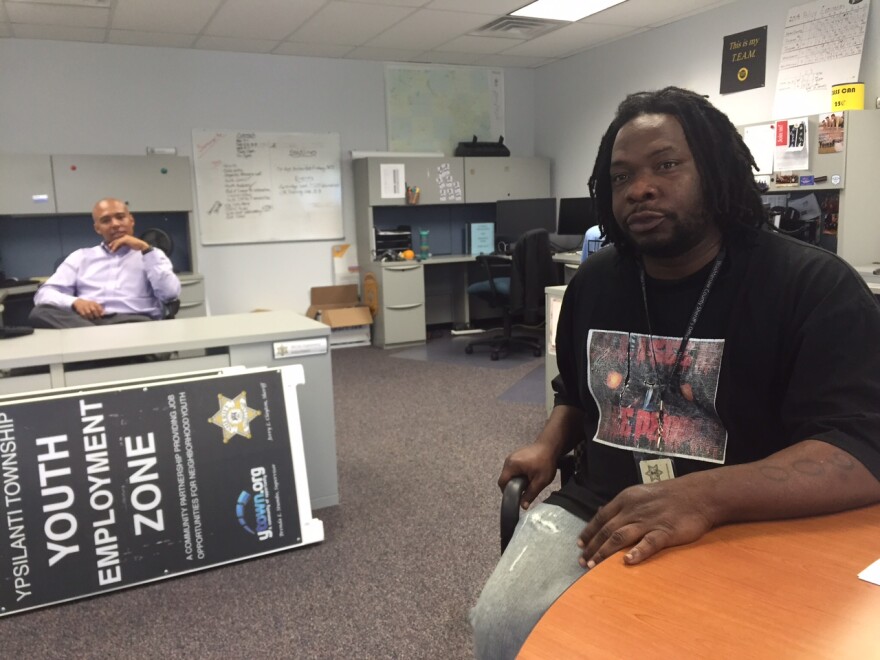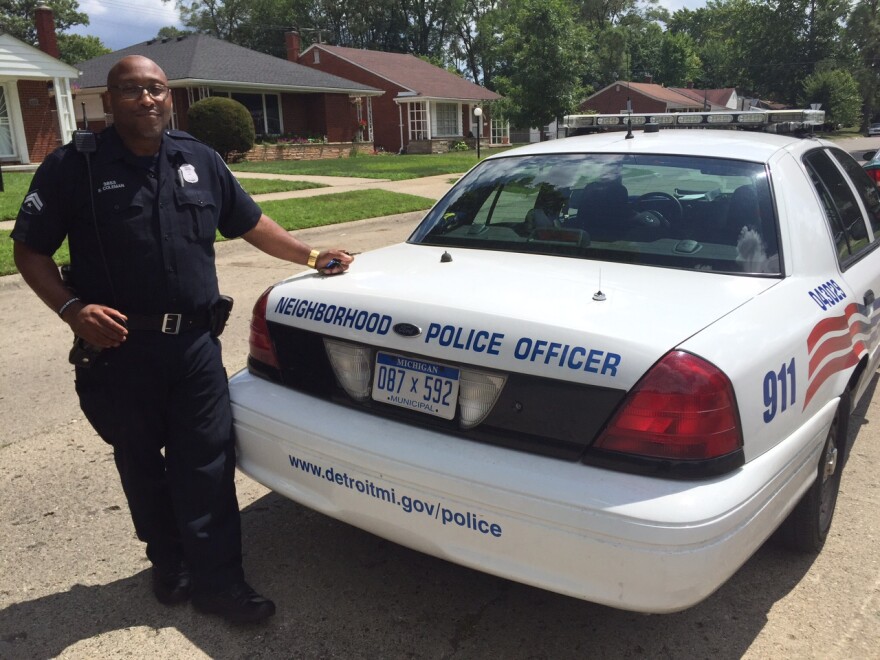Trust between police and the black community has taken a major hit after the spate of recent police shootings of black men around the country. So this week, we're taking a look at how some Michigan cities are trying to rebuild that trust, starting at the neighborhood level.
I'm the police, and I'm here to help...and BBQ
It’s 10:30 a.m. and Officer Baron Coleman’s cell phone is already blowing up with voice mail messages from Detroit residents. One guy calls about a possible squatter in the neighborhood, an older lady calls to report some drug activity at the BP gas station on 7 Mile Road, another woman leaves a message about how cars are being stripped and dumped in a lot by her house.
Coleman is what's called a Neighborhood Police Officer, one of roughly 35 in the city. His beat is all the neighborhood's in the 8th precinct on Detroit's west side. Theoretically every person who lives in that precinct has Officer Coleman's cell phone number, though on a recent patrol last week, only one out of the six residents he spoke to knew who he was; none had his number. He made sure to give his business card with his cell phone number on it to each person.
The whole point of the neighborhood police program, which started in Detroit three years ago, is to build trust between cops and residents. Right now, he says, there's a "disconnect" between the police and communities of color - not just in Detroit but across the country. It's his job to be "the connect" between the two groups and build trust where there often isn't any.
"When you call 911, officers are coming to an emergency," he explains. "They get in, catch the bad guy and go. But with a neighborhood police officer, they might call me about anything from a barking dog, to a basketball rim in the street, not liking the neighbor, neighbor not liking them, people parking on their grass. It’s like that commercial that used to come on years ago, father and son, no job too big, no job too small. We’re the neighborhood police officers, we fix it all."
Coleman’s the first one to tell you: he understand why people -- specifically African Americans -- don't trust the police. Much of the time, he says, the only interaction blacks have with police is when there’s a conflict or criminal activity; the majority of their interactions with police are negative.

But "if I come by your street every day, wave at you, be nice to you, be nice to your family..." trust will start to develop. That philosophy helps explains all the stuff he has in the trunk of his cop car: oven mitts (so he can man the grill at neighborhood cookouts), bright red camping chairs (so he can hang out at the park if there's a game or party), and a crate of juice boxes (for the kids in the neighborhood).
As the neighborhood police officer, Coleman's also responsible for staying in touch with the businesses in the area: gas stations, liquor stores, Coney Islands, and barbershops, often checking in on them once or twice a week to make sure things are going smoothly.
But does it cut down on crime?
Rob Chapman is with the U.S. Department of Justice's Office of Community Oriented Policing Services (COPS). He says it's "very difficult" to measure whether or not community policing efforts like Detroit's neighborhood police program cut down on crime, but there are studies that show how similar efforts improve residents' satisfaction with police services. "It increases the trust in their law enforcement agency and it decreases fear of crime," says Chapman.
At its core, Chapman says community policing is good policing. "It’s going out and forming relationships, enhancing relationships, institutionalizing them so that when a crisis happens you can rely on trust and goodwill, not scrambling to build relationships."
The Huffington Post has this summary of how federal funding for COPS has ebbed and flowed depending on who's in the White House:
By the 1990s, the philosophy of community policing had become widely known in law enforcement. DOJ’s Community Oriented Policing Services office was formed in 1994 as part of President Bill Clinton’s sweeping crime package. Created to support local agencies’ community policing efforts, COPS sought to get 100,000 officers hired and distribute billions in grants. COPS Principal Deputy Director Sandra Webb told HuffPost that the office has provided community policing funding for about 70 percent of law enforcement agencies nationwide. But while community policing can and does occur without federal support, Webb explained that attention for COPS’ efforts waned after Clinton’s initial investment, and the department’s budget declined significantly, from a high of $1.6 billion in 1998 to just $208 million for 2015. (In 2009, $550 million was budgeted, but the stimulus package also allocated a separate one-time $1 billion for hiring officers). The George W. Bush administration actually proposed completely eliminating the COPS program in all eight of its annual budget proposals, though it was never successful in accomplishing that.
Chapman says the COPS program doled out $134.5 million last year, and President Barack Obama's Task Force on 21st Century Policing calls for a renewed focus on community policing.
Here comes the middle man
In Washtenaw County, instead of sending out police to the neighborhoods to build trust, they send out a middle man, like 37-year old Terrence Benjamin Samuel, Jr. He grew up on the streets of Ypsilanti and has served time in state and federal prison. "I did what every gangster could do but die: drugs, gangs, robberies ... everything."

When he got out of jail, the Washtenaw County Sheriff's Office came calling. They wanted to train him for their outreach team to act as a go between for police and the people they patrol, mostly people of color.
"A lot of people don’t trust the police ... with all these killings and stuff like that," says Samuel. "The police want to help the community but they can’t just come out [to the neighborhoods], so I go for them and let them know where it’s coming from, so everybody ease up."
"People know Terrence in the neighborhood," explains Samuel's boss Derrick Jackson, a social worker turned cop who runs the county's outreach program. In neighborhoods where the majority of residents are African-American and low-income, Jackson says the police don't have a great reputation. "And so Terrence, being this intermediary, they know him, they know his history," and when they see him "shaking hands with that police officer, introducing kids to that officer, that changes the conversation. It may be a simple handshake, but it’s pretty significant in the eyes of that community."
Samuel’s been with the Sheriff’s department outreach team for about a year now. He says people who wouldn’t normally want anything to do with the police reach out to him on Facebook or when they see him driving through the neighborhood. They know they can trust him.
He says it feels good to help smooth out the friction between police and the black community.
In the short time that he's been working with the Sheriff's Office he says he's seen an improvement in the relationship between blacks and law enforcement. "It’s getting better than how it was, a lot better. Trust level's going up, and that's a beautiful thing."
(Subscribe to the State of Opportunity podcast on iTunes, Google Play, or with this RSS link)





